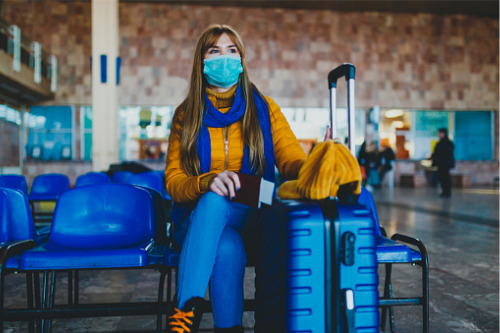

Business travellers are itching to get going again. Results from a new global travel survey conducted by Chubb revealed that 84% of business travellers cannot wait to travel again for work. This is partly because 80% or more of business travellers believe they’re missing important body language and visual clues when they cannot conduct in-person meetings, and, as a result, 74% of business travellers believe they’re less effective in their job due to the COVID-19 pandemic and severely limited travel options.
Despite this yearning for travel, the Chubb survey, entitled: ‘Time to Fly: The Impact of COVID-19 on the Present and Future of Business Travel,’ also found significant concerns among business travellers about contracting COVID-19, with 87% of respondents saying they have taken steps to protect themselves, including wearing masks and social distancing. The majority of business travellers (85%) do trust that airlines are doing everything they can to be safe, but nearly nine out of 10 business travellers (88%) expressed concern that their fellow travellers are not responsibly following COVID protocols.
The pandemic has made travel insurance and health and safety more top of mind for business travellers, according to Chubb. More than four out of five business travellers say the pandemic will make them pay more attention to what travel insurance coverage they have before taking a trip. Furthermore, 86% of business travellers agree that having travel insurance makes them more comfortable when travelling for business or leisure. And by another overwhelming margin, almost 90% of business travellers said they want to understand the safety protocols at a hotel before they stay.
“Our survey shows that business travellers are now paying closer attention to what travel insurance coverage they have before they take a trip,” said John Thompson, division president, International Accident and Health, Chubb. “As COVID recedes as a barrier to travel, the importance of best-in-class travel medical coverage and employer duty of care are increasingly being recognized.”
While there will likely be some starts and stops in the resumption of air travel, there’s one fact that’s always going to exist, according to Denise Balan, senior vice president, head of US security risks at AXA XL, which is the need for companies to consider traveller safety. Delivering a session at RIMS Live 2021, entitled: ‘Travel crisis averted: Helpful tips to keep your colleagues’ travel safe and secure,’ Balan explained the employer’s duty of care and the reasonable steps that companies should take to avoid causing harm to their travelling employees.
“Good practice dictates that plans be in place to advise travellers on safety issues. These issues can be health related, such as the fact that there is currently an Ebola outbreak in West Africa, and they can also involve more mundane safety concerns, such as crime risk or political unrest in the destination,” she said. “Most business travel is smooth and routine, but things can still happen. There are robberies, ID theft, detentions, and even natural disasters that can interfere with travel […] and let’s not forget kidnapping – it still occurs in its various forms, be it virtual, express or traditional.
“In order to satisfy duty of care, an organization should take some definitive measures, and these would include providing a traveller prior to departure with information regarding security and health information at the destination they’re heading to, providing a traveller with emergency contact information, and of course, making sure that travel protocols don’t differentiate between senior management and rank and file – it’s really important that all employees’ safety be considered equally.”
Emil de Carvalho, executive director at the global risk and intelligence consultancy S-RM, said organizations must consider prevention, preparation and response when coordinating business travel. Preparation is all about understanding the risk profile (both historic and present) of the destinations that employees are travelling to. With COVID-19 in mind, employers and travellers may want to consider active cases at the destination, hospitalizations, locally mandated health and safety protocols, and the general efficacy of COVID response at the destination compared to their country of origin.
“It’s also important to remember that when it comes to prevention and preparation, it’s not one size fits all,” said de Carvalho when co-presenting with Balan. “For some individual travellers, particular circumstances might need to be taken into account in addition to all the local threats. These individual circumstances may increase their vulnerability in a particular location. For instance, female or LGBTQ travellers may be more vulnerable to crime and harassment in some destinations than others are. And this doesn’t necessarily mean that these individuals shouldn’t travel, but they may require some extra support from their employer depending on the destination.”
The individual traveller’s security awareness is key, according to de Carvalho. Every business traveller should be aware of local threats and their own personal exposure and vulnerabilities. They should know exactly where they’re going and have a plan of how to get there safely, and they should know what to do and who to call if things go wrong. Employers can help by providing actionable information to business travellers on travel risks, and making them aware of the many resources made available by travel insurers, such as 24/7 emergency help lines and travel advice.
“Organizations should consider offering pre-departure information and training to travellers,” he added. “This might be tiered and risk-based – so ranging from an email of useful information for travel to low-threat locations, to security awareness seminars for higher risk locations, all the way through to very intense hostile environment training for those travelling to the most complex and dangerous locations around the world.”
In the context of COVID-19 this type of risk prevention and pre-departure briefing is more important than ever. As part of their duty of care, employers must ensure that their employees are comfortable to travel, they understand the risks, and they are well prepared to deal with both expected and unexpected problems should they arise.
